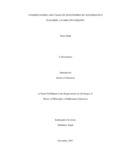
Please use this identifier to cite or link to this item:
https://hdl.handle.net/20.500.14301/365Full metadata record
| DC Field | Value | Language |
|---|---|---|
| dc.contributor.author | Dahal, Niroj | - |
| dc.date.accessioned | 2024-03-19T10:43:21Z | - |
| dc.date.available | 2024-03-19T10:43:21Z | - |
| dc.date.issued | 2017-10 | - |
| dc.identifier.citation | Dahal,N.(2017).Understanding and usage of questioning by mathematics teachers: a narrative inquiry. | en_US |
| dc.identifier.uri | https://hdl.handle.net/20.500.14301/365 | - |
| dc.description.abstract | My inquiry portrayed the existing classroom practices in mathematics pedagogy on understanding and uses of questioning by mathematics teachers. For this, narrative inquiry approach has been used to focus on experiences of six mathematics teachers working in schools in Kathmandu Valley, Nepal, by using criterion-based selection strategy to choose my participants to be involved in this research (Roulston, 2010). It aims to examine the complexities of experiences by gaining insight into how understanding and uses of questioning in mathematics classroom are embedded in mathematics teachers’ multiple and uniquely situated experiences, and in doing so, this inquiry views from various theoretical lens, namely, sociological perspectives, behaviorists to constructivists approaches, categories of questioning as per expertise, critical pedagogical perspectives and algorithmic and daily life practices, for analysis how interlock to create unequal power relations in mathematics classroom exist while questioning from teachers' view. With those issues in mind, this study was designed to explore the following research question: How do ii teachers narrate their experience of understanding and usage of questioning in relation to mathematics pedagogy? Subscribing to a narrative inquiry for meaning-making, my study foregrounds the six mathematics teachers voices and experiences, power relationship about whose experiences are valued and whose voice can be heard in their mathematics classroom while questioning the students. In keeping with narrative inquiry approaches, I use a more personal voice to reflect on mathematics teachers' understanding and uses of questioning which is an ethical challenge involved in the research process, namely: Issues of representation, as well as struggles relating to voice, is at the core of the study and reflexively considered throughout. Near to final, in conclusion of my study, the majority of the mathematics teachers seem to be conformist mathematics teacher at the beginning of their teaching career but later on, they were nonconformist by being flexible enough in questioning. Further, the majority of my research participants asked more questions within the simple to complex level and highly focusing on simple (low level) questioning, claiming to encourage students in mathematical discussion. Finally, it attempts to be an example of ethical and respectful research and claims to increase understanding of how mathematics teacher understanding and uses of questioning in the mathematics classrooms in Kathmandu Valley, Nepal. | en_US |
| dc.language.iso | en | en_US |
| dc.publisher | Kathmandu University School of Education | en_US |
| dc.title | Understanding and Usage of Questioning by Mathematics Teachers: A Narrative Inquiry | en_US |
| dc.type | Dissertation | en_US |
| local.school.name | SOED | en_US |
| local.school.department | DOSE | en_US |
| local.school.program | MPhil in STEAM Educaiton | en_US |
| local.school.level | M.Phil. | en_US |
| Appears in Collections: | Dissertation | |
Files in This Item:
| File | Description | Size | Format | |
|---|---|---|---|---|
| UNDERSTANDINGANDUSAGEOFQUESTIONINGBYMATHEMATICS_NIROJDAHAL--MPhil Dissertation.pdf | 1.04 MB | Adobe PDF |  View/Open |
Items in DSpace are protected by copyright, with all rights reserved, unless otherwise indicated.